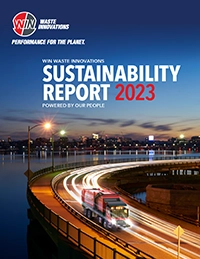WIN Waste Millbury
Waste-to-Energy Facility in Millbury, MA

About
The WIN Waste Millbury waste-to-energy facility diverts residential and commercial waste from landfills and converts it into renewable energy that powers homes in the communities we serve.
Each year, WIN Waste Millbury converts about 488,000 tons of post-recycled waste into renewable energy through a highly efficient combustion process that meets strict federal and state standards. The renewable energy generated at the Millbury waste-to-energy facility is enough to power the equivalent of 30,100+ local homes and businesses.
Contact
Address:
331 Southwest Cutoff Road
Millbury, MA 01527
Hours:
Monday to Saturday: 4:00 a.m. to 6:00 p.m.
Phone:
508-791-8900
Special Waste Accepted:
Yes
specialwaste@win-waste.com
Open to the Public:
No
Began Operations:
1987
Reducing carbon dioxide equivalent (CO2e) with waste-to-energy
By offsetting the need for fossil fuels, diverting waste from landfills and recycling thousands of tons of metals, waste-to-energy remains the EPA-preferred method for end disposal. Our process not only preserves valuable natural resources and ever-filling landfill space, but it also reduces greenhouse gases. Across all of WIN Waste’s waste-to-energy facilities, processing one ton of waste avoids up to two tons of carbon dioxide equivalent (CO2e) into the atmosphere.
Sustainability Report
Our commitment to sustainability is more important today than it ever has been. WIN Waste Innovations scores high on sustainability with a 4-star rating (out of 5) and are ranked in the top five companies globally for sustainability performance within our sector: environmental services — waste treatment. See how we embed sustainability at every step of our operations:
In the community
WIN Waste Millbury is an essential and active community partner. We are committed to community success and strive every day to not only service the communities we operate in, but we aim to make them even better. We focus our time, talent and resources to support a cleaner environment, a more vibrant community and more equitable opportunities for our workforce. We prioritize the environment in our services and support community organizations that work towards a more sustainable future — from planting urban tree canopies in Baltimore to restoring sparrow nests in New England’s coastal marshes.
